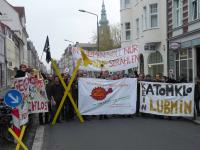Protests against the mid-December delivery of nuclear waste from Cadarache in southern France to the interim storage hall in Lubmin on the Baltic Coast are projected to get substantially bigger than previously expected, predicts Felix Leipold of the Rostock Anti-Nuclear Network. A networking conference in Greifswald on 21 November to organise the protests against the senseless transportation of highly radioactive waste brought together some 45 activist organisations from all over northern Germany.
Already in the afternoon a delegation of activists from the Wendland (Gorleben) and the Greifswald Anti-Nuclear Initiative got the ball rolling with a sit-in blockade on the main driveway into the storage hall. “We’re going to get in the way of not only the Gorleben-CASTORS, but will fight all dangerous and irresponsible nuclear transportation,” said Freya Rudek of the Lüneburg Castor Resistance Action Alliance (ABC).
Thousands of people are expected for a rally in Greifswald on 11 December, starting at 1 p.m. The Lüchow-Dannenberg Environment Civic Action Group, the umbrella organisation of the Gorleben resistance, has pledged broad support for the demonstration and the action days to follow.
On Day X, expected to be 15 or 16 December, actions are planned throughout Germany along the route the train carrying the CASTORS (Caskets for the Transportation and Storage of Nuclear Waste) to Lubmin will take. Action is being mobilised especially in such towns as Erfurt, Halle, Magdeburg, Ludwigslust, Rostock, Potsdam/Berlin and Neubrandenburg as well as at the Franco-German border near Karlsruhe.
Rail squat blockades and creative actions are planned for the last 22 kilometres of track from Greifswald to the interim depot. Alerted by the waves of protest in recent months, the Lubmin initiatives are preparing on a bigger scale than ever. Places to sleep for a thousand people are available in and around Greifswald, for example in community houses. More accommodation is still needed for visiting activists.
“We will not just stand idly by as the scandalous transport races along at an irresponsible 100 km per hour, as it did recently in Gorleben,” said civil engineer Bernd Ebeling of the Uelzen group, contrAtom. “The transport as such is already a huge safety risk.”
Ebeling notes that only computer simulations have been done of the behaviour of CASTORS in accidents. Drop tests were done in the 80s with only one type of casket and a drop speed of 50 hm/h. This was why an application for criminal prosecution was being filed with the state attorney’s office, Ebeling said.
Physicist Wolfgang Neumann from Hanover, a nuclear expert, explained that in case of an accident with a long-burning fire (such as the explosion of a tank wagon) large amounts of radioactive particles could be released. In wind direction even 15 km away the limit of 50 millisieverts in the radiation protection regulations would be exceeded; within a radius of five kilometres the population would have to be evacuated or resettled long-term.
For international media contact: Phone #49 170-1223239
For more information contact Felix Leipold, mobile 0170 1223239; Freya Rudek, mobile 0151 58829067; Bernd Ebeling, mobile 0171 5011762.

